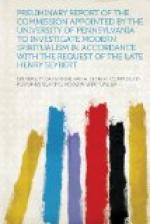1. That he thought the things he saw in the seances with Slade were different from jugglery.
2. That he did not think there was time or opportunity for Slade to prepare deceptions.
3. That he himself knew nothing of jugglery, nor did Professor Zoellner.
4. That he can testify to the facts as described by Zoellner, and that he could not himself have described the occurrences better than they are described in Zoellner’s book:—to the facts he is willing to testify, the means he declares unknown to him, but does not regard jugglery as a sufficient explanation. If another can understand, he said, how jugglery can explain the facts, well and good—he can not.
5. That he had never seen anything of the kind before, and has not since; it being his only experience of Spiritualism.
6. That he had the greatest freedom to experiment and set conditions, and that the conditions were favorable to observation.
7. That he regarded Professor Fechner as one of the best observers in the world, and Professor Scheibner as an excellent observer.
8. That Professor Zoellner was not at that time, in any sense, in an abnormal mental condition.
Professor Weber seemed unwilling to speak decidedly on the subject, but showed that he leaned to the Spiritistic interpretation of the facts. He said that the things done indicated intelligence on the part of the doer.
Having now before us the testimony given by these survivors of the famous investigation, I will collect briefly the facts relating to each of those concerned—adding in one or two cases from other sources—and point out the nature and value of their testimony to the occurrences recorded by Professor Zoellner.
1. As to Professor Wundt, who is by profession an experimental psychologist, and an observer. Professor Wundt did not regard the investigation, so far as he participated, as in any respect thorough or satisfactory. The conditions of observation were not present. When called upon by Professor Ulrici to describe the occurrences as he saw them, he said he would not willingly describe what he had not had opportunity to observe.
2. As to Professor Zoellner, the chief witness and author of the book published, a number of points are worthy of note.
(1.) The question of his mental condition at the time of the investigation. It is asserted by Baron Hellenbach (see Geburt und Tod etc., Wien, 1885, S. 96) that Zoellner was of sound mind up to his death. The statement should have due weight, but the author’s general attitude towards Spiritism should not be overlooked. I do not consider his testimony for Zoellner’s sanity as good as that of Fechner or Scheibner against. Of the four men mentioned as connected with him, Wundt, Weber, Fechner and Scheibner, three (all except Weber) are decidedly of the opinion that his mental condition




